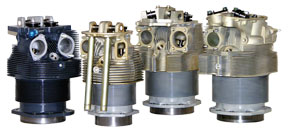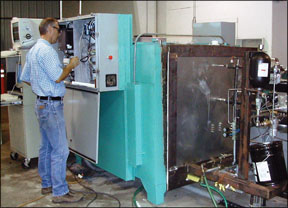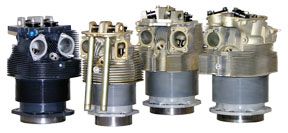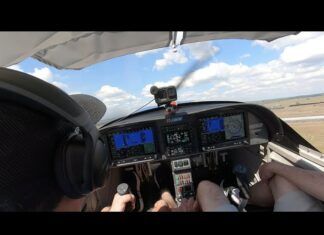In the four years since our last survey (May 2004 Aviation Consumer), several things have changed in the world of engine overhauls. Teledyne Continental Motors (TCM) and Textron-Lycoming have both pumped up their marketing of zero-timed and factory-overhauled engines. Engine and cylinder rebuilders have expanded their presence with both Engine Components, Inc. (ECI) and Superior Air Parts offering complete engines to the experimental market. Superior is even certifying their Vantage engine to compete with the Lycoming O-360 and IO-360.
For all thats changed, however, the long-term viability of your new engine will largely depend on the quality of your cylinders. Is it a better road to use aftermarket cylinders like Superior Millenniums or ECI Titans? Or is it a safer bet to go with the OEM product?
We asked our readers for their experiences with new cylinders bought from Lycoming, TCM, ECI and Superior, as we’ll as with overhauled cylinders. (We didnt distinguish between overhauls done in the field vs. factory-overhauled units). Specifically, we asked questions like whether the cylinders made it to TBO, what early problems cropped up, how the manufacturer was on customer support and if the owner would use the same cylinders again. We also followed up with shops, the companies, and some individual owners to ferret out some specific issues with individual brands.
Promising Trends
Since our last look at cylinders, quality and customer service seem to be improving. don’t get too excited by that statement, however,

because the 2004 range was “mediocre to dismal.” Today its crawled all the way up to “pretty good to disappointing.”
Across the board, owners reported back that cylinders only made it an average of 528 hours before they needed work or replacement. While some respondents reported 1700 hours or more with no problems, they were the exception, and usually were at flight school or Part 135 operations where engines were flown hard and frequently. This reinforces the time-honored thinking that cylinders do we’ll when used regularly.
Customer service is part of the equation, too. We didnt get enough comments one way or the other to say anything about Lycoming support. But considering the survey is an open opportunity for someone looking for a place to vent-and several respondents did just that-no comments about customer support from Lycoming is telling. Respondents rated their customer satisfaction on a scale from one to 10, with 10 being best. The averages were all between 3.9 and 5.6, so we cant say anything with real authority here.
The bottom-line question, however, is “Would you buy this cylinder again?” Here Lycoming was the walk-away winner scoring 85-percent yes. Superior and ECI did well, with about a two-thirds retention. TCM took up the rear with a 55-percent yes. Thats worse that the 61-percent who would buy overhauled cylinders again, but an improvement over four years ago when two out of three TCM customers said they wont purchase TCM cylinders again.
Lycoming Leads the Pack
LLycoming has suffered near disastrous and expensive quality control issues with its crankshafts since our last survey, but its cylinder quality seems to be exceptional..
Stiff competition in the aftermarket has gotten Lycoming to drop their prices on cylinders when aftermarket cylinders (also known as PMA, or Parts Manufacturing Authority, cylinders) are available. This has created a two-tier system for Lycoming engine owners. When the engine is common, such as many of the parallel-valve IO-360s, there are at least four options: Factory-new from Lycoming, PMA cylinders from ECI or Superior, or overhauls. Any of the first three will run you around $1000 a jug. The overhaul may be only $100-150 less. Given the potential for longer field life of new cylinders, owners and shops simply arent bothering with overhauled cylinders on these engines and many are happy with Lycomings product. In the words of Alex Courtney of Penn Yann Aero, “We see about a 50-50 split between OEM and aftermarket cylinders … but the Lycoming nitrided barrels just work.”
Its a different story for angle-valve IO-360s where its either factory-new or overhaul. The price delta can be over $800 per cylinder. Based on comments from our surveys and talking to shops, few owners are opting for overhauled cylinders We suspect this may be skewing the results of how many Lycoming owners used factory new and would do so again. They simply see no other choice.
We didnt see any areas that seemed particularly prone to failures, nor did we see any differences between quality in the past and currently. We did hear a few stories of parts that stood the test of time. The owner of a Piper Lance with a Lycoming IO-540 told us, “New Lycoming cylinders installed in 1983 made 2065 hours with the lowest compression at TBO being 74/80. There is no logbook entry indicating that the cylinders were ever removed from the engine for any reason. The same cylinders were overhauled and returned to service.”
Continental Improves
Owner complaints with TCM cylinders fell into a pattern: low compression, valve guide wear and exhaust valves burning. As one IO-550-powered Cessna 185 owner put it, “This is my third engine

and I have had to replace cylinders every time.”
Nearly three out of four cylinders showed signs of early wear or loss of compression. A rather dismal 13 percent of TCM cylinders reported in our survey made it to TBO without some work. We only had one respondent for engines under 200 horsepower, but he had burning and sticking valves on both an O-200 and a C-145 (O-300) requiring replacements shy of 500 hours. Shops we spoke with confirmed that low compression and valve/guide issues were not uncommon.
The glaring exception was with operations that ran their engines hard and often. One respondent was chief inspector for a flight department that sees about 17,000 hours annually on 14 piston aircraft, all of which use Continental engines. “We buy only TCM cylinders as we’ll as only TCM remanufactured engines. Having tried most of the other PMA equipment in the past, overall our best success is with OEM equipment.” We followed up to see how often engines went to TBO with no work. He told us, “It happens maybe 25 percent of the time. However, we push the TBO to 2000 hours, 300 over the published recommendation. We are a Part 91 operator.”
The key factor here may be that those 2000 hours are flown in about 18 months. While no aircraft engine like to sit unused, TCM cylinders seem especially vulnerable, based on what owners and shops tell us.
Persistence was a word that kept coming up with regards to getting warranty support from TCM. While one owner called warranty service a “horse-trading experience,” we saw overall good reports about TCM coming through with the requested parts when problems did arise. TCM told us they are currently looking at these issues.
ECI Rebounds
Back in 2004, we picked ECI a top choice for cylinders, but theyve had some tough breaks since then-literally. From 2002 to late 2005, ECI had their own process of machining cylinder barrels and flanges. In late 2005, they changed their process somewhat to match a new system Lycoming had instituted. Unfortunately, the result was a mismatch that created a stress point where the head met the cylinder and a number of severe, in-service failures.
From 2002-2005, ECI produced about 16,000 cylinders and saw 29 barrel separations. Between late 2005 and February of 2006, when ECI discovered the source of the problem, they had already seen eight failures out of 1200 cylinders – a six-fold increase. ECI has issued a service bulletin (SB) and the FAA is proposing an AD. The AD will probably call for 50-hour inspections of the pre-2005 jugs (category A in the SB) and replacement of the 2005-6 batch (category B in the SB).
We don’t see this as a reason to stay away from ECI, however. Charlie Melot of Zephyr Aircraft Engines put this best: “don’t hold it against a company A, B, or C for a recall. What you want to know is whos going to have the next one, and there’s no crystal ball for that.” He also noted that hed bet the failure rate for field overhauls was at or worse than 0.1 percent in ECIs category A.
ECI has, in our opinion, mostly stepped up to the plate here. Replacement of outright failures in either category is free parts and a labor allowance. Some of our survey respondents felt the labor allowance was too low. Preemptive replacement of working jugs in category A will be pro-rated with a cost of $500-$900 per cylinder. Preemptive replacement in category B will be $300 plus a labor allowance.
We point all this out because ECI has gone further by creating their own testing program to ferret out this kind of problem in the future. They redesigned their Titan series of new cylinders, and then tested them on a machine to simulate takeoff temps and pressures 24 hours a day.
According to Glen Golden, President of ECI, the first batches of corrected cylinders performed about equally to the Lycoming factory cylinders. Some design tweaks now have ECI cylinders lasting twice as long in the torture chamber.
ECI prices are competitive and their Nickel+Carbide plating process has gotten good results from the field. Owners and shops routinely report low oil consumption and good performance. We saw several comments like the Cessna 182 owner who told us, “I had to demand that the [engine overhaul] shop use ECI Titan cylinders. They had experienced warranty issues on ECIs chrome cylinders and didnt want anything to do with CermiNil. The cylinders broke in so quickly that no one could believe it. Since then all of my compressions measurements have been consistently very high; my IA describes this engine as perfect. ”
The plating also cant rust, so these cylinders can be an excellent choice for aircraft that don’t fly regularly or experience big temperature swings in moist climates, which leads to condensation on the cylinder walls.
Overall, owner experience with ECI was good, but not flawless. The owner of six jugs who saw five of his six cylinders fail on separate flights (two at night) has every right to complain. Still, our findings show ECI as a solid company with a solid product that they are actively improving. Good news for angle-valve Lycoming owners is that Golden told us to expect angle-valve Lycoming replacements as the next offering from ECI.
Superior Stays Steady
Some owns swear by Superiors Millennium cylinders while others report problems. Said one, “We have overhauled this engine several times and this is the first time we made it to (and past) TBO. We installed Millennium cylinders on the advice of our mechanic and it was great advice.”
What complaints we saw were mostly on ring wear and some valve issues. Where there are problems, they seem to come at low time in service, usually less than 200 hours. This may be indicative of quality control issues at Superior or installation problems. We don’t have enough data to say. Superior has had issues with ring-wall seating in the past, but shops we asked say they don’t see this problem any more, so we feel this is no longer an issue.
Superior touts the best warranty of the lot, running 36 months or TBO. They also offer a 500-hour/three-year money-back guarantee. If you don’t like the cylinders you can get your full money back. Thats only on the cylinders, though. Youd still be out the labor costs.
Since 2005, Superior cylinders have been manufactured by Thielert in Germany. According to Superior, theyve had only 60 warranty claims on 24,000 cylinders since then, including items like broken fins from shipping damage.
We saw a few strong complaints about Superiors warranty support, but they seem to congregate on older rebuilds and on items like shipping or labor. An owner of an O-300-powered 172 had a rebuild this year, and saw issues with valves on all six cylinders in the first 50 hours. He told us, “Superior said that they would pay for the repairs and a reasonable amount of labor. We are just finishing up the cylinder replacements so do not have a conclusion on Superiors warranty.”
Overhauls Have a Place
We looked specifically at overhauled cylinders in the January 2007 issue and stand by what we said there. For complete engine overhauls, new cylinders make sense even when the price delta is high because there is no aftermarket option to compete with the factory product.
Life isn’t always so cut-and-dried, though. When youre 1300 hours into an engine that expects only a 1700-hour TBO and two cylinders come up soft at an annual, overhauls can be a good choice. Because prices for some new cylinders has dropped, perfectly serviceable cylinders are being retired when complete engines are being overhauled.
Just be clear on what youre getting when you purchase an overhaul. Technically, a cylinder could be called overhauled with an inspection and new rockers, exhaust studs and exhaust-valve guides. It may be within service limits on diameter, rather than new limits. As Courtney of Penn Yann put it, “If you get quoted a surprisingly low price, there’s probably a reason.”
As a side note, Penn Yann told us they wont do overhauled cylinders with the Lycoming O-235. Overhauls often involve boring out the cylinder 0.010 inches wider that the original size and the O-235 has a thinner barrel wall than most engines. Boring can lead to hairline cracks that, in turn, lead to broken rings.
If we were truly cash-strapped, wed be tempted by ECIs Freedom series of overhauled cylinders that have the CermiNil coating. They are backed by a warranty close to ECIs Titans. We didnt have enough data in our survey, though, to say how these cylinders are doing in the field.
No Single Solution
The best choice for a set of replacement cylinders may depend on your use patterns. We didnt see a strong correlation between hours flown and satisfaction with a particular make of cylinder, but one respondent who oversees a small fleet of light and high-performance singles noted that nickel-carbide cylinders were a plus “for engines that fly less than 200 hours per year and especially the ones that tend to sit all winter.” Other shops reported similar experiences.
Even a light coating of rust will get scraped off at start up and enter the oil, hastening the wear process throughout the engine. Penn Yan also sees Lycoming nitrided barrels resisting corrosion well.
With fuel prices rising and many private owners flying less, we see this as a real factor in deciding where your next cylinders are coming from. Based on this and our survey of owners and shops, factory-new or ECI are good bets for Lycoming engines, and ECI would be our pick for Continentals.


